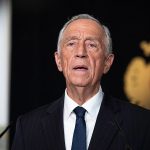‘Restoring passenger confidence is our biggest goal’ says Faro airport boss
Faro Airport boss discusses impact of pandemic
By MICHAEL BRUXO
[email protected]
Restoring confidence in air travel will be crucial to helping Faro Airport and the entire aviation industry recover from the effects of the Covid-19 pandemic, said Faro Airport boss Alberto Mota Borges on Tuesday, June 30.
His statement came during an Ireland Portugal Business Network-organised meeting via Zoom on Tuesday (June 30).
“Our biggest problem at the moment is the lack of confidence among passengers,” Mota Borges said.
“We are working alongside airlines to change this perception and show passengers that we comply with all (Covid-19) guidelines.”
Uncertainty appears to be a major reason why many people are still wary of flying, even if air traffic is expected to “increase significantly in July and August,” he confirmed. “Ryanair is also resuming over 30 air links from Wednesday, July 1.”
Despite the positive signs, said the airport boss, “Many people are still only buying their tickets the day before the flight”. In other words, travellers do not feel confident enough to buy their tickets in advance as they fear the situation might deteriorate by the time they are due to fly.
Mota Borges assures all guidelines are being followed at Faro Airport. Stickers have been put on the floor to remind passengers to maintain social distance. Vending machines selling masks and other protective items are also in place.
As he explained, airport users must wear a mask at all times when inside the terminal building and “all areas are disinfected daily”.
Regarding temperature checks and other ‘controls’, several readers have contacted the Resident about what they say is a total absence of these at Faro Airport.
Gordon Wilkie told us: “My son arrived from the UK today on Wizz Air from Luton. No UK airport checks for temperature abnormality, no onboard social distancing (aircraft crammed full). Everyone giving a landing form with tracking information for collection at Faro (never collected) and no checks for temperature abnormality in Faro. So, my question … is this how we proceed from now on after eight weeks of lockdown and throw caution to the wind?”
Another reader said his Dutch friend flew back from Amsterdam (Schiphol) to Faro and “there were no checks or controls whatsoever, in Holland or upon arrival here — he boarded and walked out at the other end, drove to his Algarve home, not having talked to anyone”.
An airport source has since explained that temperatures are actually checked without passengers realising, as special body temperature screening cameras are used. Passengers will only be stopped for a manual temperature check if their temperature is 38ºC. If the second check lines up with the first, the national health service hotline SNS24 is contacted.
“Systems are new and are being improved every day,” said the source.
Air travel specialists agree confidence is key
The general director of the International Air Transport Association (IATA) also described passenger confidence as “critical” to the recovery of the industry.
“According to IATA research, at the beginning of March, around 60% of air travellers said they would return to travel within six months. By June, only 45% said they would return. So safety measures and communication are key,” said Alexandre de Juniac
He explained that: “More than 80% of passengers believe there is a risk of infection when flying — from queuing, from close proximity to potentially infected people, from breathing inside an airplane”.
“I can’t emphasise enough how critical passenger confidence is. We are working across the industry to send this message across,” de Juniac added.










